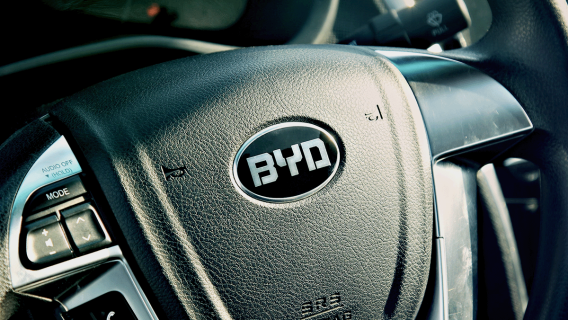Imagine if I told you there was an electric vehicle maker that sold twice as many cars as Tesla (TSLA), has seen its revenue grow at a double-digit clip for years, and yet its stock is three times cheaper than Tesla’s on a price-to-earnings basis. You’d probably be interested in this surging electric vehicle stock. The catch? It’s actually a Chinese EV stock, and you won’t find its vehicles on U.S. shores.
The company in question, BYD, isn’t a household name, at least not in the U.S. But it’s no spring chicken. Founded in 2003 by Wang Chuanfu, BYD (which stands for “Build Your Dreams”) has long been one of China’s top automakers. What really sent its sales into hyperdrive, however, was when it made the switch to all battery electric and hybrid plug-in vehicles in 2022.
Revenues instantly tripled, going from $22.7 billion in 2020 (a record, despite the pandemic) to $63 billion in 2022. In 2023, sales improved another 35%, to $85 billion. In 2024, the company recorded $107.2 billion in revenue, or 29% growth, with another 20%+ growth expected in 2025.
Part of what makes BYD unique is the wide array of price points on its vehicles. Last year, launched the company the “Seagull,” the cheapest electric vehicle in existence at a starting price of a mere $9,700 (or 70,000 yuan). It also makes the most expensive mass-produced car in China, the Yangwang U9, a high-performance electric supercar that costs $236,000. But neither of those vehicles are BYD’s top sellers; those would be the Song ($21,000 starting price) and the Qin ($16,500).
But there’s even greater upside.
[text_ad]
Right now, BYD does roughly 90% of its business in China, accounting for one-third of the country’s total sales of EVs and hybrids. The company is trying to change that, recently opening its full-assembly plant outside of China, with a new plant in Thailand starting deliveries. A plant in Uzbekistan puts together partially assembled vehicles. And BYD has plans to open more new plants in Cambodia, Hungary, Indonesia, Pakistan and Turkey. Mexico and Vietnam are possible targets as well.
So that covers Europe, Southeast Asia and South America. You’ll notice there are no plans to expand into the U.S. While BYD does have a minor presence here – it makes electric buses in California – it’s mostly staying out of America to avoid high tariffs and political conflict, two factors that will only ratchet up under a second Trump term.
And BYD is doing more than just expanding production; the company is also working on the cutting edge of new EV features, recently unveiling a car that can be charged as quickly as a gas-fueled car – in five minutes.
Called the Super e-Platform, it features faster-charging batteries, a 30,000 RPM motor and new silicon carbide power chips. Able to charge at two kilometers per second, the Super e-Platforms can charge 400 kilometers in just five minutes – the fastest charging speed of any mass-produced electric vehicle.
Coming on the heels of its dual announcements of the new “God’s Eye” self-driving technology and AI features enhanced by a new deal with Chinese upstart DeepSeek, BYD is suddenly looking like the most advanced electric vehicle producer in the world, making its goals of becoming a dominant global force – and not just China’s top EV maker – look more realistic by the day.
Even without the U.S. market, it’s already the biggest EV and hybrid manufacturer in the world. And that’s from selling nine out of every 10 cars in China alone.
The company long ago caught Warren Buffett’s attention. Berkshire Hathaway invested $230 million in BYD in 2008, when it was just a Chinese automaker with no real EV presence. Today, that investment has ballooned to $1.84 billion. Granted, Berkshire did trim its stake in BYD a couple times last year, from over 7% to just under 5%. But Buffett and company have been paring back positions across the board this year. So, Berkshire’s reduced stake in BYD shouldn’t be a concern.
BYD (BYDDY) Stock Performance
As for BYD stock, which trades as an American Depositary Receipt (ADR) under the ticker symbol BYDDY, it was up a healthy 26% in 2024 and has risen an even more impressive 60% so far this year alone.
At 23.3x forward earnings estimates, BYDDY currently trades at less than a third of its five-year average forward P/E ratio (89.6). And its price-to-sales ratio (1.56) is a fraction of rival Tesla’s (TSLA) (8.91).
On their own, the outsized performance or game-changing tech developments would each make a strong case for BYD going forward, but put them together, and it’s my favorite stock for the rest of the year.
I recommended BYDDY months ago to readers of my Cabot Stock of the Week advisory, which every Monday recommends a new stock from among seven of Cabot’s top investment newsletter portfolios. To learn the names of the other stocks I’m currently recommending, click here.
[author_ad]
*This post has been updated from a previously published version.


